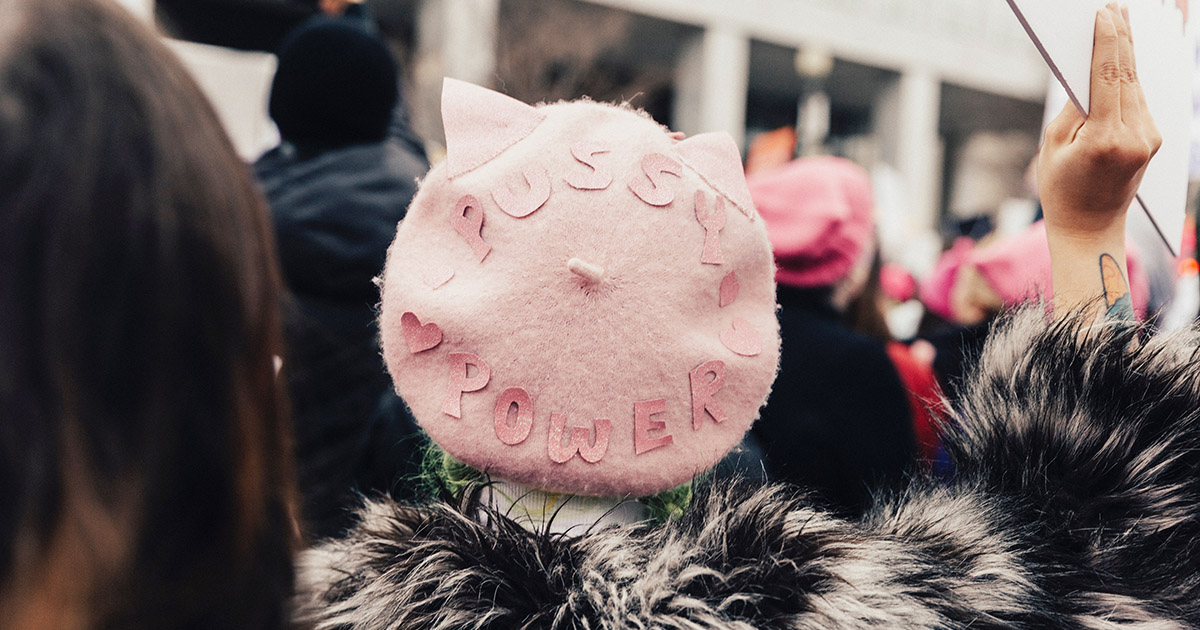EDITORIAL
★ ★ ★ ★
THE FIGHT ON OUR DOORSTEP

By Kusi Okamura
I’m tired of being nice. Weary-to-my-bones tired.
And I look at the women around me and I know I’m not alone.
I can see it in the recent #MeToo, the Women’s marches, the fight for reproductive rights around the world.
But there have been centuries, aeons of tired women, fighting, resisting.
Because we are tired of the pretence.
Ask any woman out there.
We are so very tired of being nice.
From a young age we are urged to be nice girls.
“Be nice.” We know what that means.
It is a veil, a shield sometimes, a wolf in sheep’s clothing.
It means to check oneself, to change, relinquish, to adapt to make others feel comfortable, to put other people’s feelings and needs first.
Predominantly men.
Because in our patriarchal society, men and their needs will always come first.
We are groomed to be in the service of men.
Our physical selves, our emotional selves, our intellectual selves, all to be adapted according to men and their needs, their egos.
Don’t be too loud, too big, too much.
Smooth yourself out.
Don’t argue, never correct, criticise, say ‘no’.
No unwanted hair, no muscles, no strength, no ambition.
Be pre-pubescent.
Be small, be sweet, be submissive.
An angel, a living doll.
But we are tired, us women.
We are tired of the myriad indignities, the inequalities, the degradations that we put up with in our everyday lives.
We are tired of the subtle messages that surround us that tell us that we are less than, not good enough.
We are tired of the harassment, the catcalls, the abuse, the assaults and violence on our persons.
We are tired of smiling, enduring, indulging, to get a job, to get ahead, to walk down the street.
We are tired of being intimidated, being threatened, being fearful of our safety.
We are tired, but our voices are getting stronger.
Together we are getting stronger.
* * * *
There’s a clarity that comes sometimes in a sea-change. And it feels more and more that we as women are inching towards a tipping point.
With each new outrage that seems to come on too regular a basis, our tolerance is waning. And for me it seems to be ever clearer where the issues lie.
How we are viewed as women is something that has long been on my mind. From a young age I struggled with the inequalities of being a woman, and why they were accepted as the norm.
In the recent aftermath of Harvey Weinstein, there was an eerie echo to the responses by men who cited their daughters when thinking about the victims. As if this fact was needed to humanise the victims in some way. It reminded me of how in kidnapping or hostage situations they recommend that you talk to your captor and tell them personal details of your life. Tell them you are a wife, a mother, a daughter, a human being. Because those who do terrible things to others have to cut this association off. This essential connection between human beings.
How is it now that men have to be reminded that women are human beings too? It seems like we have always been in that place. See the rhetoric of Donald Trump. The casual misogyny. Remember him mocking Hillary Clinton for going to the bathroom before a debate. “It’s too disgusting,’ he said, “I can’t even think about it.” That women’s bodies disgust men is so prevalent, so normal. That we feel shame for having periods, body hair, a vagina, getting pregnant, giving birth, for even going to the toilet. That this shame is accepted and commonplace is in itself shameful and bewildering.
But the terrible truth is that this dehumanisation of women (and let’s admit it, all minorities, people of colour, LGBTQ community, ethnic peoples) affects every single one of us, maybe men most of all.
Listen to the language that is used to describe Harvey Weinstein and the slew of abusers in his wake – “Pig”, “Animal”, “Monster”. It conveys the disgust that we feel at the actions of these men. However in this condemnation it can often have the effect of making us think that these are not men that we live with, work with, see every day. The fact is that these are normal men, who in their terrible actions became dehumanised, so disconnected are they from their own humanity. They are monsters of their own making.
But their actions only reflect this bigger issue of how women are viewed in our society. Patriarchy is what props it all up, with sexism and misogyny at its core. Hate upon hate upon hate. And this is what needs to be changed. Now. To protect us from continuing to inflict damage upon women, men and society as a whole.
* * * *
Those of you who know The Wild Word will not be surprised by the fierce feminism in our words. Strong voices that assert the rights of women. And now more than ever it feels needed, this righteous indignation.
You can see it in the writing of my sisters-in-arms, Jami Ingledue, Lorna O’Hara, and Annie Mark-Westfall, who all explore, in different ways, the effect of sexism and misogyny on women, their families, and society in general.
My brother-in-arms Mike Hembury’s essay on the rise of neo-Nazism also struck a chord this month. Living in Berlin, this is a personal issue. The recent election of the AfD party to parliament here was a shock. As Mike outlines in his essay, the AfD are the suit-and-tie faction of the neo-Nazis here in Berlin.
Last week they had a rally around the corner from our house. Neo-nazis were in our lovely safe neighbourhood of Berlin, spewing their thinly veiled hate speech against immigrants, Muslims, women, the LGBTQ community. And all credit to the good man that my husband is, he went down and joined the protestors and made himself hoarse shouting ‘Nazi’s out!’ That he would have to shout such a thing in this day and age is where we are at.
Meanwhile as I finished putting my kids to bed, I found myself on the day of the #MeToo campaign, in the wake of Harvey Weinstein, becoming increasingly angrier at the inequalities, the indignities, the degradations that as women we put up with.
Shouting down neo-Nazis on our street, asserting women’s rights at home.
It is clear that the fight is now on our doorsteps.
And we need all the good women, and all the good men, to fight this fight now.

Kusi Okamura is the founder and editor of The Wild Word. She lives with her family in Berlin.

DEAR READER
At The Wild Word we are proud to present some of the best online writing around, as well as being a platform for new and emerging writers and artists.
As a non-profit, the entire site is a labour of love.
If you have read the work in The Wild Word and like what we do, please put something in our tip jar.
THANK YOU FOR YOUR SUPPORT!























